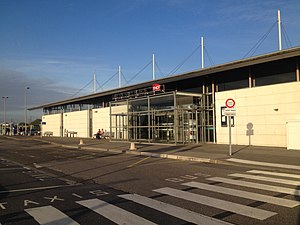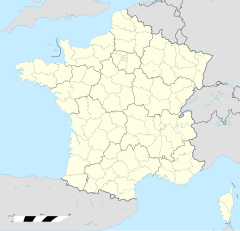TGV Haute-Picardie station
| SNCF | |||||
 The station entrance | |||||
| General information | |||||
| Location | Ablaincourt-Pressoir Somme, Picardy | ||||
| Coordinates | 49°51′33″N 2°49′54″E / 49.85917°N 2.83167°E | ||||
| Elevation | 83 m | ||||
| Owned by | SNCF | ||||
| Operated by | SNCF | ||||
| Line(s) | LGV Nord | ||||
| Platforms | 2 | ||||
| Tracks | 4 | ||||
| Train operators | TGV | ||||
| Other information | |||||
| Station code | 87313882 | ||||
| History | |||||
| Opened | 3 July 1994 | ||||
| Passengers | |||||
| 2016 | 324 016 | ||||
| |||||
Haute-Picardie TGV station (French: Gare de TGV Haute-Picardie) is a railway station on the LGV Nord-Europe between Lille and Paris. Geographically, it is located about 10 km (6 mi) west of Péronne, between the towns of Saint Quentin and Amiens, in the heart of the Battle of the Somme territory.
Overview
[edit]When built, it was criticised by the press for being too far from any of the neighbouring towns to be useful. It was located near a trunk road rather than a connecting railway line: it was often nicknamed la gare des betteraves, or 'sugar beet station', as it is surrounded by sugar beet fields, as it was the case for some rail stations in the countryside at the beginning of the twentieth century, when those vegetables were still transported almost exclusively by train to the nearest sugar refinery.
Today, the station is connected with the two local main cities, namely Amiens to the west and Saint Quentin to the east, by the A29 motorway – it takes around 30 minutes to reach either city and a bus shuttle service operates four times per day.[1]
The annual number of passengers varies from 360,000 to 400,000.
As a very small TGV station, from the point of view of watching the trains the platform is only a few metres from the main running lines, where trains pass by at 300 km/h (190 mph), and there is a good view of the lines in both directions. At most stations on high-speed lines there is some form of barrier preventing this close up viewing from the platform. Since 2013, passengers are not allowed onto the platforms until the arrival of the next stopping train, in order to avoid any risk of being hit by flying track ballast.
There is a business park close to the station.
References
[edit]- ^ "Plan des lignes TER Hauts-de-France" (PDF). www.ter.sncf.com (in French). Retrieved 21 April 2022.
External links
[edit]- TGV Haute-Picardie station at "Gares & Connexions", the official website of SNCF (in French)
| Preceding station | SNCF | Following station | ||
|---|---|---|---|---|
| Arras towards
|
TGV inOui Brussels–Nice
|
Aéroport Charles de Gaulle towards
| ||
| TGV inOui Lille-Europe–Marseille
|
||||
| TGV inOui Lille-Europe–Montpellier
|
||||
| TGV inOui Lille-Flandres–Bordeaux
|
||||
| TGV inOui Lille-Flandres–Marseille
|
||||
| Lille-Europe towards
|
TGV inOui Brussels–Nice
|
|||
| Lille-Europe towards Brussels-South
|
TGV inOui | Aéroport Charles de Gaulle towards Marseille
| ||
| Lille-Europe towards
|
TGV inOui Lille-Europe–Bordeaux
|
Aéroport Charles de Gaulle towards
| ||
| Lille-Europe Terminus
|
TGV inOui | Aéroport Charles de Gaulle towards Bourg-Saint-Maurice
| ||
| Lille-Europe towards
|
TGV inOui Lille-Europe–Marseille
|
Aéroport Charles de Gaulle towards
| ||
| TGV inOui Lille-Europe–Montpellier
|
||||
| TGV inOui Lille-Europe–Nantes
|
||||
| TGV inOui Lille-Europe–Rennes
|
||||
| Preceding station | Ouigo | Following station | ||
| Lille-Flandres Terminus
|
Ouigo | Aéroport Charles de Gaulle towards Marseille
| ||
| Tourcoing Terminus
|
Aéroport Charles de Gaulle towards Bordeaux
| |||

